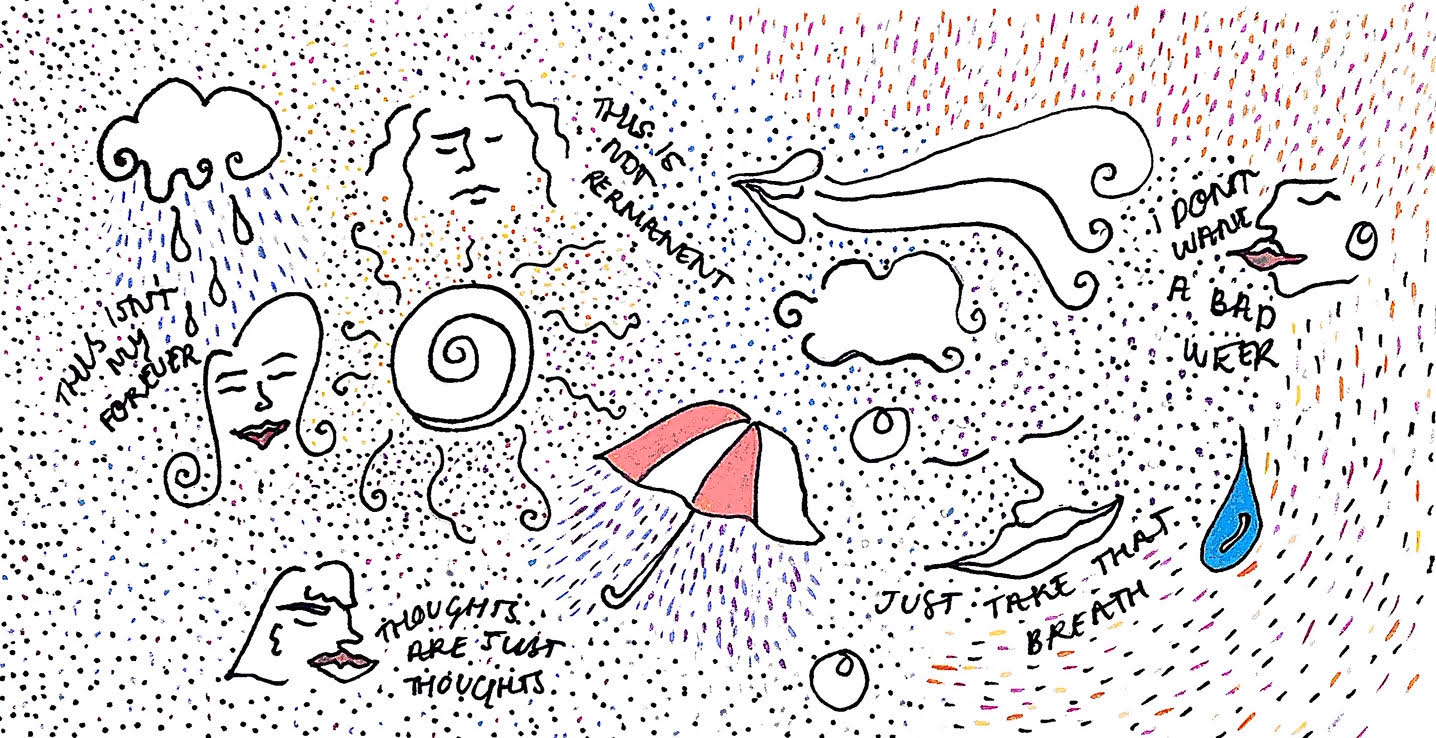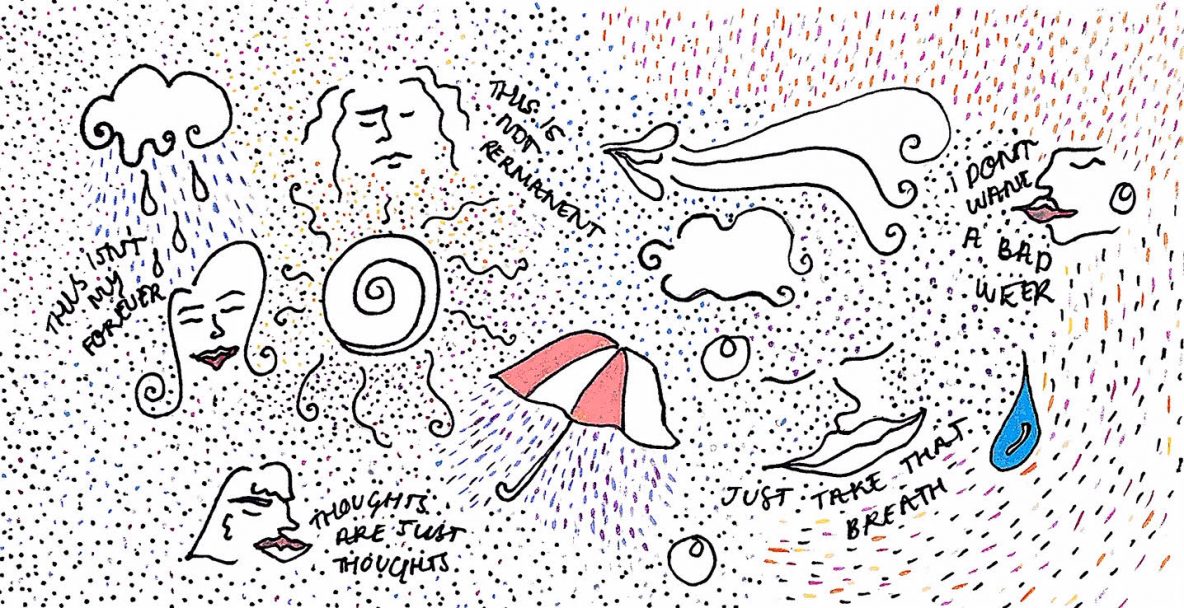6 THINGS CBT TAUGHT ME THAT I WISH I KNEW EARLIER
By Aoife McCourt / 26 January 2020

Illustration by Thea Elmsley
Cognitive behavioural therapy aims to teach us new and healthy
ways to manage and control our thought patterns and behaviours.
CBT is used to treat a wide range of mental health problems, most commonly depression and anxiety disorders. In the U.K alone, 1 in 4 people experience mental health problems within a year and by 2016 the rates of depression and anxiety had increased by 70% in just 25 years yet the topic of therapy or seeking some form of professional help remains a painfully taboo one today. This is because we live in a society where needing help equates to ‘weakness’ and is something to be ‘ashamed’ of. Therefore, to help fight the current mental health crisis, we must start opening up the conversation and normalise speaking to one another about our own experiences regarding our mental health journeys.
I am going to share 6 key things that I learnt from CBT in the hope that they are useful to someone else, and to remind people that they are not alone in this.
1) Don’t let your temporary thoughts and feelings determine the coming days. Instead of jumping to the conclusion that it’s going to be another ‘bad week’ or ‘one of those days’, I’m seeing it as just a ‘bad moment’, staying open to the idea that at any given time I could be in a much better, clearer mindset. Our thoughts are forever changing so in the meantime focus on your breathing and remind yourself that this isn’t permanent.
2) We can change our thought patterns. When we do anything for long enough, such as driving a car or riding a bike, it can become automatic and the same applies to negative thinking styles. Cognitive therapy shows that once you becomes aware of how your negative thoughts influence your feelings, it IS possible to retrain your mind and replace them with more appropriate thoughts and behaviours. Keep challenging those negative and/or intrusive thoughts, it will pay off.
3) The importance of self-assessment. Reflect and question what you could have done in response to when you were feeling low or anxious. Treat your struggles like any other test and give it your all to work through it. Remember that although finding positives in all situations is tough, you will grow from this negative situation and become more resilient to life’s challenges, big or small, and more controlled in the way you react to them going forward. I used to have a bad habit of isolating myself or lying in bed whenever I was feeling low, but I’ve finally realised that sometimes, to give yourself a chance at feeling better, you need to be firm with yourself and push yourself out there. Ask yourself what’s good for your soul – this can take some time to figure out, but once you do, it will be so helpful. For me, simply going on a walk, being outdoors and listening to my favourite playlist helps put my mind more at ease.
4) The benefits of journaling. Writing out your thoughts can be therapeutic as it as though the page is taking any worries or anxieties out of your head and articulating them for you, relieving the pressure of having them weighing on your mind. According to The National Science Foundation, it is estimated that our minds have anything between 12,000-70,000 thoughts per day – 80% of which are negative –and so we can easily feel like our minds are racing. Therefore, it can be helpful to take some time to let go and make sense of your thoughts.
5) Thoughts are just thoughts. We often treat our thoughts as facts. As someone who has lived with severe anxiety and OCD over loss since early childhood, for the majority of my life I had convinced myself that, by even speaking about death or by not carrying out a certain behaviour when it came into my mind, something bad would happen. Although it may initially seem simple, it can actually be difficult to separate our fears from facts as anxiety can be an extremely convincing liar. Despite how difficult it was to do, when I started speaking in depth about my fears to my therapist and resisting the urge to carry out a behaviour, I realised just because we think something does not mean it is true, and this has made my thoughts far less intimidating. Instead of taking my thoughts to be facts, I have learnt how important it is to rationalise them, as suppressing them only makes them come back louder and more often.
6) Everyone, with or without mental illness, experiences negative/intrusive thoughts. For a long time, I believed that I was never going to be able to ‘find happiness’ again, but therapy helped me realise that happiness is not the absence of negative thinking. An
international study lead by Concordia psychology professor Adam Radomsky in 2014 shows that almost 94% of university students who are not diagnosed with any mental illness experience unwanted or intrusive thoughts. This showed me that I’m a lot more ‘normal’ and less alone than I believed I was for so long. Happiness is whatever happiness means to you; it looks different on everyone and mental illness does not make you exempt from feeling it, just as the absence of mental illness does not make you immune to negative thoughts.
With all that being said, these lessons are by no means easy cures for depression or anxiety; however, they can be extremely helpful in helping you to manage your thoughts and behaviours.
For too long I believed that my mental illness was in control of me, but CBT helped me discover that this is not true despite it feeling this way sometimes. It takes time and hard work, but it doesn’t always have to be this hard. As Matt Haig writes in his bestselling book Reasons to Stay Alive, ‘Depression is also smaller than you. Always...even when it feels vast. It operates within you, you do not operate within it. It may be a dark cloud passing across the sky but - if that is the metaphor - you are the sky. You were there before it. And the cloud can't exist without the sky, but the sky can exist without the cloud.’
Whilst therapy isn’t for everyone, I recommend to anyone at least considering giving it a chance as it might just change your life. Be gentle with yourself – the mind can be a very dark and scary place, but you’ve got this. Don’t let anyone undermine your strength, especially yourself!
Here are some links that can explain a bit more about CBT...
- NHS - https://www.nhs.uk/conditions/cognitive-behavioural-therapy-cbt/how-it-works/
- Mind - https://www.mind.org.uk/information-support/drugs-and-treatments/cognitive-behavioural-therapy-cbt/about-cbt/
- Psychcentral - https://psychcentral.com/lib/in-depth-cognitive-behavioral-therapy/
- LoveLiveSimple - http://livelovesimple.com/cognitive-behavioral-therapy-saved-my-life/
Art by
Words by
Share this article

